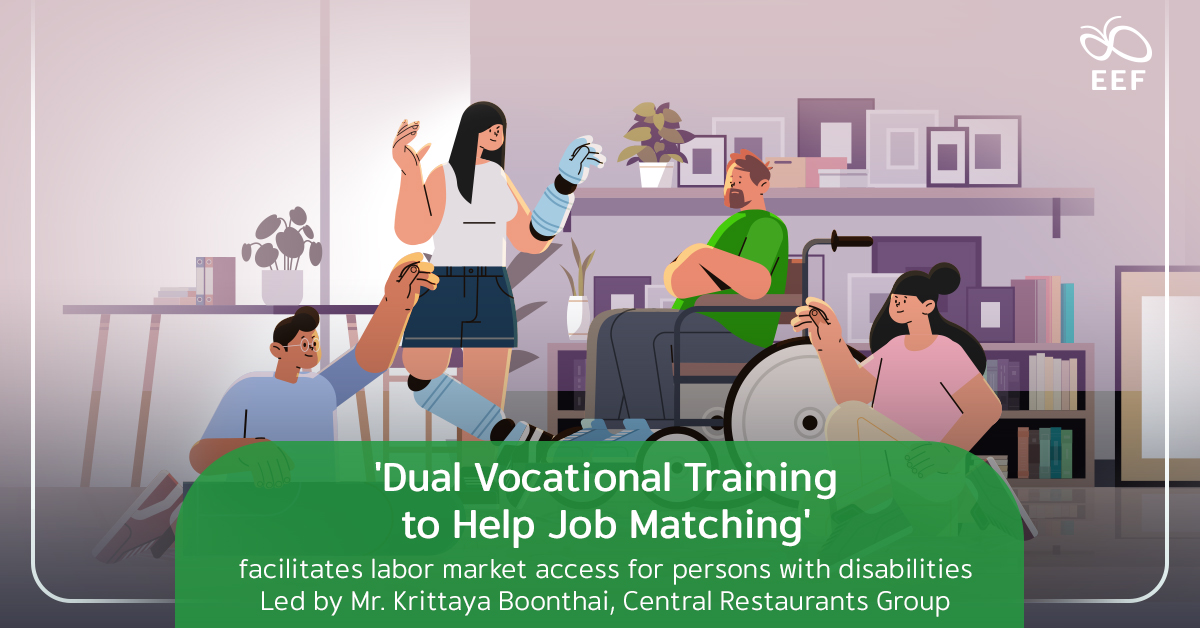
“The Dual Vocational Training system, in which vocational institutes and businesses collaborate, serves as a gateway for persons with disabilities to access the labor market, enhancing opportunities to explore and discover themselves through real work experiences. It also inspires persons with disabilities to have goals for learning and self-development, while businesses have more opportunities to discover employees with potential, to foster mutual growth.”
“The key is to match the job and abilities so that the job and the workers will complement each other. For example, disabled individuals working with us not only earn an income to support themselves and their families but also have career advancement opportunities just like other workers.”
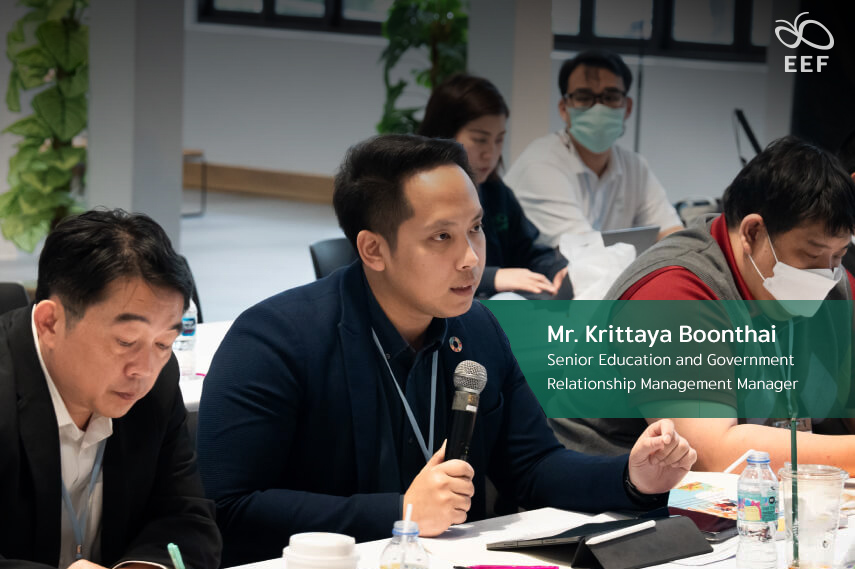
Mr. Krittaya Boonthai, Senior Education and Government Relationship Management Manager, Central Restaurants Group (CRG), a leader in the Quick Service Restaurants business managing over 20 brands, discussed the ‘Dual Vocational Training system’ as the ‘Heart’ of education that aims at employment for disabled people through one year of study at educational institutions combined with one year of real work experience at businesses. This is considered quality ‘preparation’ and transition’ of students with targeted job employment. The private sector not only helps develop personnel but also creates new avenues to discover ‘potential’ disabled individuals for employment in accordance with Employment Law, Section 33.”
“From our experience managing Dual Vocational Training with over 600 vocational institutions, both public and private, over the past 18 years, we see that vocational institutions specialize in laying the foundation for personnel, using processes that help students understand their characteristics, identifying their strengths and weaknesses, and then developing from those skills or limitations.”
“Then, when transferred to the workplace, we find that job performance significantly contributes to skill development, enhancing self-awareness of their worth. Seeing that they have the potential to earn and progress further motivates them to seek knowledge and aim higher. Younger peers at the institutes, seeing their seniors succeed and find their paths, are also inspired to enter the labor market. Therefore, if we can expand cooperation between educational institutions and businesses, groups of students with special needs or disabilities will have increased opportunities to learn and develop themselves for their careers.”

Mr. Krittaya has drawn upon experiences from the ‘Diversity Hiring Policy‘ at Central Restaurants Group, which has designed a system allowing disabled employees to work alongside non-disabled employees. Over the nine years of hiring disabled employees in Central Restaurants Group, there is concrete evidence that if disabled individuals find suitable, interesting, and feasible jobs, it directly influences their dedication to enhancing their capabilities and advancing to higher job positions.”
“Anyone who works continuously for some time will develop skills and qualities unique to the job, which ‘not just anyone can do.’ Once they reach that point, they are ready to grow into a team leader/supervisor or manager positions.”
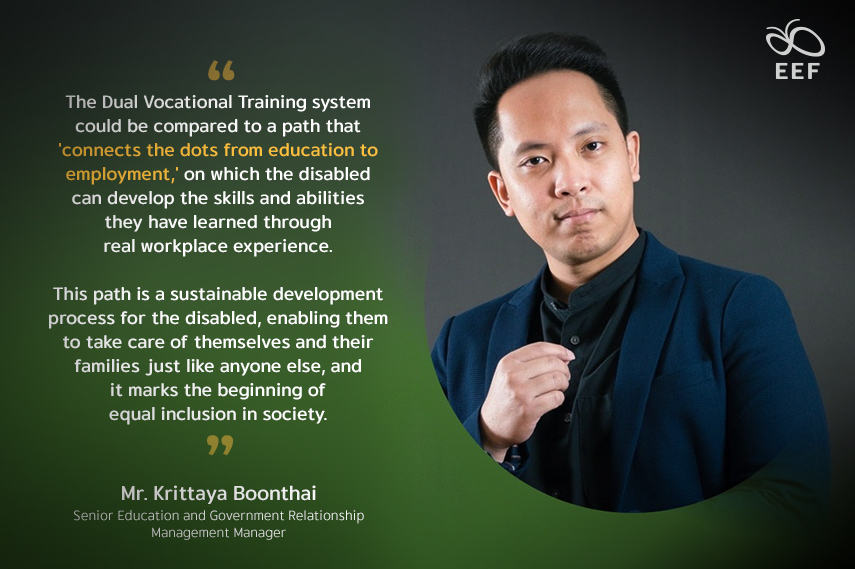
“The Dual Vocational Training system could be compared to a path that ‘connects the dots from education to employment,’ on which the disabled can develop the skills and abilities they have learned through real workplace experience. This path is a sustainable development process for the disabled, enabling them to take care of themselves and their families just like anyone else, and it marks the beginning of equal inclusion in society.”
‘Real Work Experience’ is a profound lesson everyone must go through.
Mr. Krittaya provided examples of the working approach in the Central Restaurants Group, which uses the workplace as a learning platform to adjust communication and coexistence based on diversity. This approach initially assigns newly disabled employees, who may not yet be ready for extensive communication, to work in the back of the restaurant, limiting their communication to within the department. As they adapt, they may transition to the middle of the restaurant to practice communication skills with employees from other departments until they become proficient. Eventually, they will have the opportunity to move to the front of the restaurant to interact with internal employees and customers.
This approach demonstrates that nearly every disabled person can develop themselves faster in all aspects when they communicate and work with both disabled and non-disabled employees, as well as service users. On the other hand, other coworkers can also learn to adapt to individual differences and collaborate well.
“Work plays a significant role in stimulating employees to explore various communication methods and gradually develop their skills every day. We believe each restaurant zone (Service Sector) has its charm. As they meet both fellow disabled colleagues and coworkers, their communication confidence increases. Once they transition to the front of the restaurant and interact with customers, they will face the pressure of receiving praise and criticism. Each day brings a mix of positive and negative experiences and various challenges to solve. Everyone must go through these realities of work, and these experiences will strengthen people both externally and internally.”
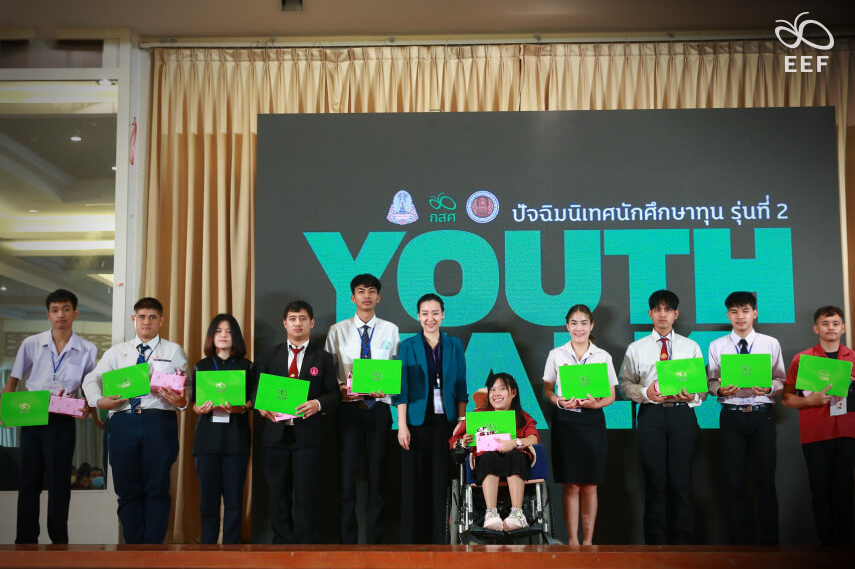
As a private sector participant in the High Vocational Innovation Scholarship Program for students with special needs, in collaboration with the Equitable Education Fund (EEF) Thailand, Mr. Krittaya stated that the responsibilities and experiences gained from working with people and facing various situations are an ‘Investment’ that not only helps persons with disabilities grow and advance in their career but also serves as a ‘Life Force’ that can be applied to other future endeavors.
“Having worked with persons with disabilities continuously over the years, we now have employees with disabilities who have been with us since their school days, many of whom have become team leaders or have shown they have the potential to do more than just one job. They can work for us as well as operate their businesses. We believe the key factor is that, whether disabled or not, their skills have been polished, enriched through experience, and given ample opportunities, they can sustainably pursue a career and grow.”
“Therefore, by applying the employment law outlined in section 33 of the Empowerment of Persons with Disabilities Act, which mandates that every establishment must employ persons with disabilities to work in suitable positions, we can align the educational management process for employment of persons with disabilities with businesses, and both the business sector and the disabled themselves will have more opportunities to connect. Importantly, this cooperation should not just be for 1-2 years, but must be passed on from generation to generation, becoming institutionalized where all parties can flourish together.”
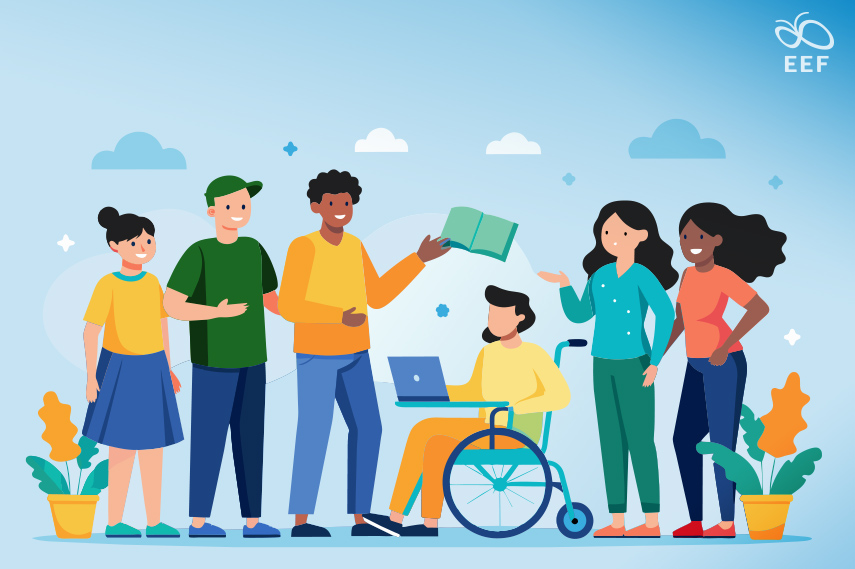
About 2,000 vocational students from the Dual Vocational Training system enroll in the learning process and work within the Central Restaurants Group each year. Some are from the ‘High Vocational Innovation Scholarship Program for students with special needs,’ a collaboration between EEF Thailand, the Office of the Vocational Education Commission, and the Faculty of Education at Chulalongkorn University, now in its fifth year. This initiative aims to enhance opportunities for disabled persons with potential but lacking financial resources and opportunities to pursue the High Vocational Certificate Program, focusing on employment opportunities. The program emphasizes the expansion of the cooperation network between vocational institutions and the private business sector (Social Partners) nationwide.
Credit: Rawis Larha | Content and Writer Production Officer
Source: (Innovation Scholarships Program for Students with Special Needs) ‘Dual Vocational Training to Help Job Matching,’ Mr. Krittaya Boontai, Central Restaurants Group. https://www.eef.or.th/article-190124/

